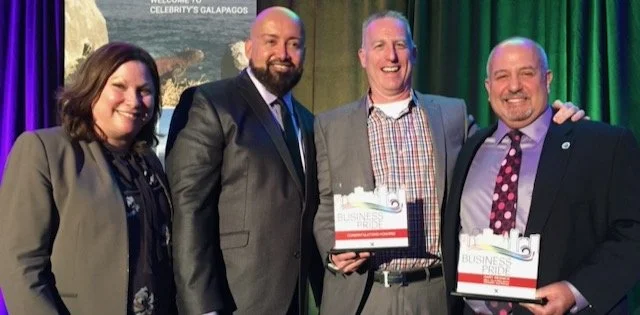South Florida Business Journal Business of Pride Awards - Q&A with Lee Rubin
Excerpt from South Florida Business Journal, Business of Pride Awards - June 29, 2018
Editor's Note: The Business of Pride Awards is the South Florida Business Journal's inaugural spotlight on local LGBTQ executives or straight allies of the LGBTQ community who excel in business and work to advance LGBTQ businesses and/or the LGBTQ community. A celebration was held June 28 at the Kimpton EPIC Hotel in Miami.
Lee Rubin
Lee Rubin’s career and workplace are effusive with inclusion. He has been involved with the largest LGBTQ civil rights organizations at a national level, was on the national board of governors for the Human Rights Campaign (HRC), was on the board of directors and board chair of the National LGBTQ Task Force, and several LGBTQ local boards, and was recognized on South Florida Gay News’ 2015 Out 50 list of South Florida’s most influential LGBT people.
With the help of the Citrix Corporate Citizenship initiative, Rubin led Citrix’s response to the Pulse nightclub shootings in 2016 by creating the Citrix Orlando Victims Fund, which raised $50,000 for the victims.
“Diversity and inclusion is not just a set of events or a check-the-box exercise for Citrix. It’s ingrained in who we are and the way we work every day,” he says. “When we look at our core values – integrity, respect, curiosity, courage and unity – they clearly align with our diversity and inclusion initiatives.”
What advice do you have for young LGBTQ professionals? Try to work with a company with a commitment to diversity and inclusion. You will spend most of your waking hours at work, and it is important to feel comfortable to be able to bring your “full self” to work each day. You can identify employers with a commitment to diversity and inclusion for LGBTQ employees by looking at the following criteria: How do they score on the HRC Corporate Equality Index? Does their equal employment opportunity policy include the terms “sexual orientation” and “gender identity or expression”? Do they have an LGBTQ employee resource group?
What do you view as the key LGBTQ issues impacting business? The fact that Florida doesn’t have protections for “sexual orientation and gender identity” as part of the Florida Civil Rights Act is probably the biggest LGBTQ issue impacting businesses in the state. In fact, The Washington Post has said that Amazon will consider LGBT rights and protections in the criteria for selecting HQ2, and that South Florida probably won’t be a finalist because of our lack of workplace protections.
As an LGBTQ professional, what responsibility do you have to advocate for inclusion in the workplace? As an LGBTQ leader at Citrix, I am especially proud of the work I have been able to do around how Citrix is using our “corporate voice” to show how discriminatory legislation effects our business. By signing on to amicus briefs and by joining groups like Equality Means Business and Freedom for All Americans, we have been able to show the incredible power corporations have to further equality by using our voices for change on these issues.
Is it easier for business professionals to be out in today’s climate? Yes, I believe that being out allows you be the best “you” you can be. You can be more authentic, have deeper friendships and build trust with your co-workers. Having to hide who you are takes a toll, and the energy that is expended hiding who you are can be better used toward more productive endeavors.
Why is it important for businesses to target the LGBTQ labor market? If diversity and inclusion is not a core value of your business, you may be missing the best candidates. Innovation comes from looking at problems from a different perspectives and, if everyone has the same life experiences and backgrounds, they are less likely to innovate. Harvard Business Review reported on a study that showed that more diverse companies are 45 percent more likely to report growth in market share and 70 percent more likely to capture new markets.
Do you think LGBTQ business owners face different challenges than straight business owners? I believe you also need to acknowledge that being LGBTQ is not a shared experience. There is intersectionality to being LGBTQ. If you are a woman and LGBTQ, you face the discrimination of the LGBTQ community and the additional barriers that all women face. [Similarly, for black, transgender, gender nonconforming or other LGBTQ people, you face different challenges than white gays and lesbians face.] So I believe there isn’t just one set of challenges for LGBTQ business owners, just as there isn’t a single set of challenges for straight business owners.

